Unit 3 Topic 2 Some things usually have different meanings in different cultures. Section A 课件(共24张
文档属性
| 名称 | Unit 3 Topic 2 Some things usually have different meanings in different cultures. Section A 课件(共24张 |
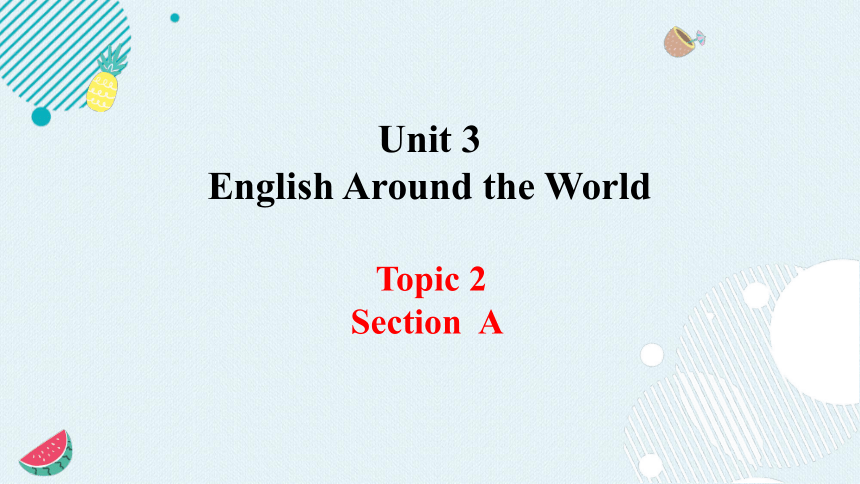
|
|
| 格式 | pptx | ||
| 文件大小 | 46.0MB | ||
| 资源类型 | 教案 | ||
| 版本资源 | 仁爱科普版 | ||
| 科目 | 英语 | ||
| 更新时间 | 2024-07-22 11:19:09 | ||
图片预览

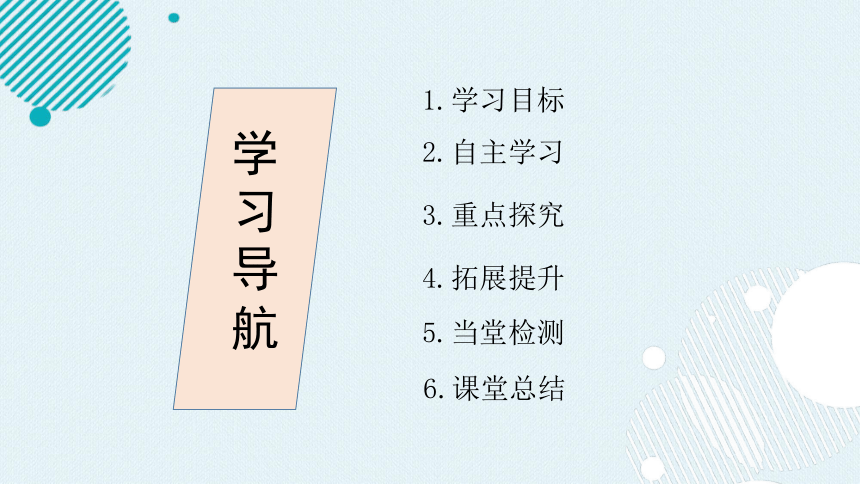

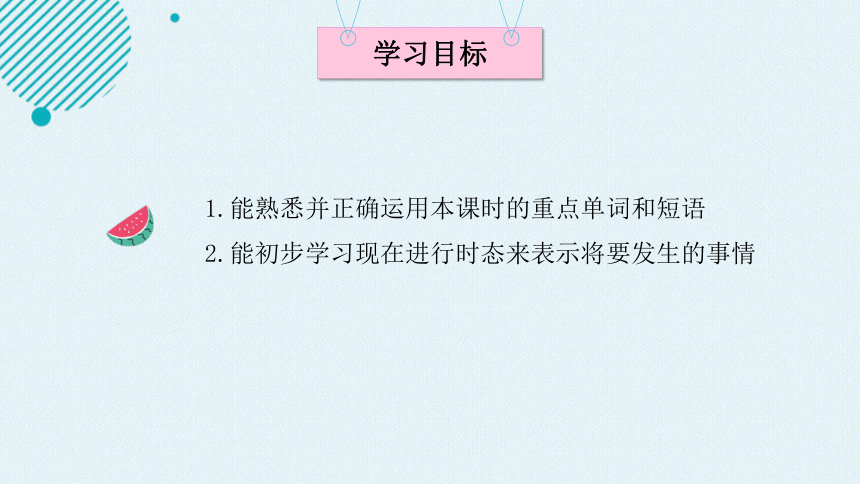
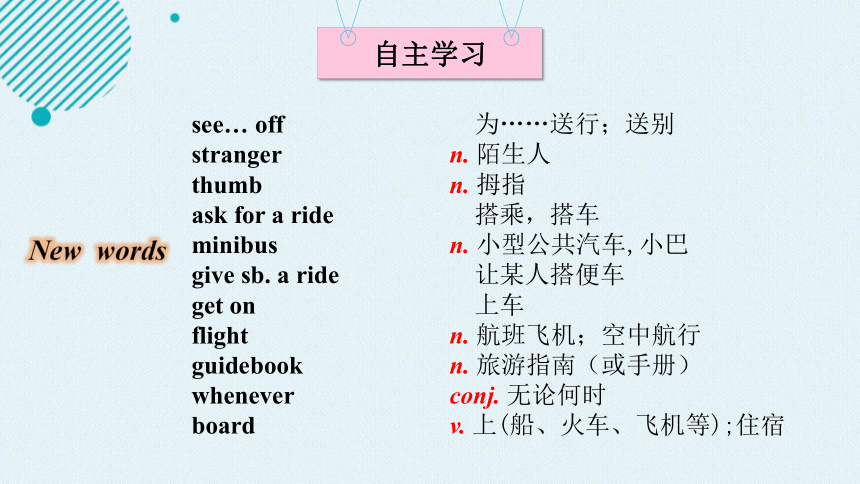
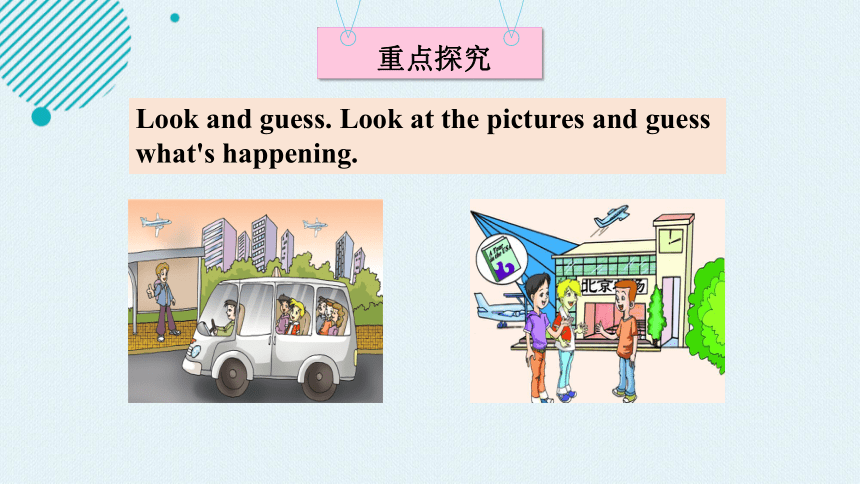
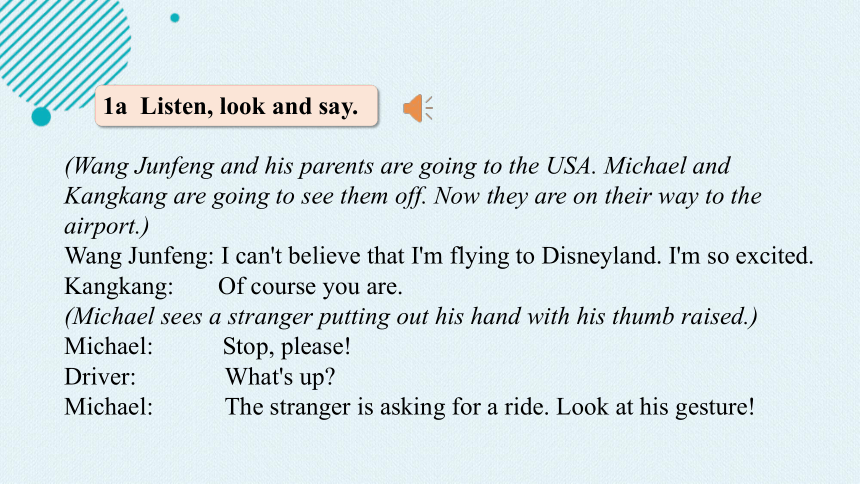

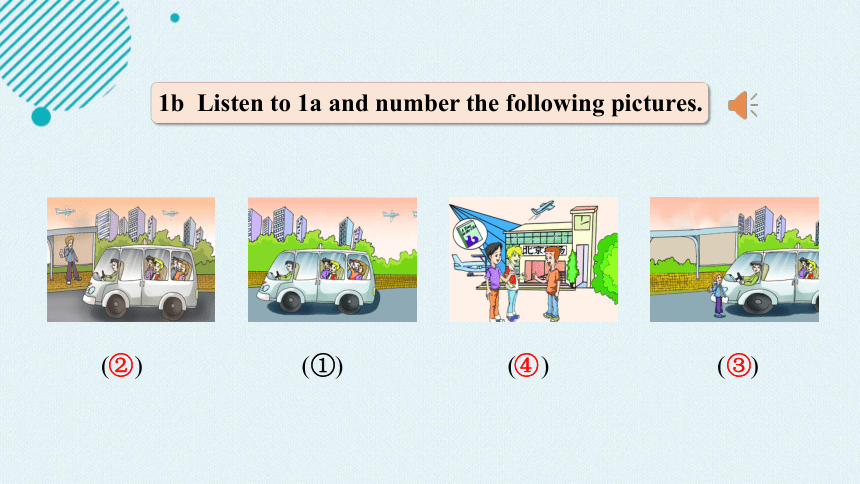
文档简介
(共24张PPT)
Unit 3
English Around the World
Topic 2
Section A
1.学习目标
3.重点探究
2.自主学习
学习导航
5.当堂检测
6.课堂总结
4.拓展提升
新课导入
Let’ watch a video
学习目标
1.能熟悉并正确运用本课时的重点单词和短语
2.能初步学习现在进行时态来表示将要发生的事情
自主学习
New words
see… off 为……送行;送别
stranger n. 陌生人
thumb n. 拇指
ask for a ride 搭乘,搭车
minibus n. 小型公共汽车,小巴
give sb. a ride 让某人搭便车
get on 上车
flight n. 航班飞机;空中航行
guidebook n. 旅游指南(或手册)
whenever conj. 无论何时
board v. 上(船、火车、飞机等);住宿
Look and guess. Look at the pictures and guess what's happening.
重点探究
1a Listen, look and say.
(Wang Junfeng and his parents are going to the USA. Michael and Kangkang are going to see them off. Now they are on their way to the airport.)
Wang Junfeng: I can't believe that I'm flying to Disneyland. I'm so excited.
Kangkang: Of course you are.
(Michael sees a stranger putting out his hand with his thumb raised.)
Michael: Stop, please!
Driver: What's up
Michael: The stranger is asking for a ride. Look at his gesture!
(The driver stops the minibus.)
Foreigner: Excuse me, could you please give me a ride to the airport
Driver: Sure. We're going to the same place. Get on, please.
Foreigner: Thank you very much.
(They reach the airport twenty minutes later.)
Kangkang: What time is your flight
Wang Junfeng: At 5 o'clock. My uncle is meeting us tomorrow. But I'm still
worried about my English.
Kangkang: No need to worry. You can buy the guidebook, A Tour in the USA.
Wang Junfeng: Good idea. I hope I won't have much difficulty in communication.
Michael: Whenever you need help, send me an e-mail or call me.
Wang Junfeng: Thank you very much. I have to go now. Bye!
1b Listen to 1a and number the following pictures.
( )
( )
( )
( )
②
③
④
①
Listen to 1a and choose the best answer.
( ) 1. What does Michael see a stranger doing
A. Waving his hand excitedly.
B. Putting out his hand with his thumb raised.
C. Shaking hands with others.
( ) 2. Who is meeting them tomorrow
A. His friend. B. His aunt. C. His uncle.
( ) 3. What is Wang Junfeng worried about
A. His English. B. where to buy the guidebook.
C. How to ask for help.
A
B
C
1c Read 1a and mark T (True) or F (False).
( ) 1. Michael and Kangkang are going to see Wang Junfeng's
family off at a bus station.
( ) 2. Wang Junfeng's family and the stranger are leaving for
Disneyland.
( ) 3. The driver stops the minibus and gives the stranger a ride.
( ) 4. Michael tells Wang Junfeng to send him an e-mail or call
him if he needs any help.
F
F
T
T
Pair work
Watch the flash of 1a, Then act out the dialogue in pairs.
2 Listen to the passage and choose the correct answers.
( ) 1. Where does Bob come from
A. London. B. America. C. Australia.
( ) 2. When is he going to London
A. On Sunday. B. Next Saturday. C. Next Sunday.
( ) 3. How many people are going to see him off
A. Two. B. Three. C. Four.
( ) 4. Who is meeting Bob at the airport
A. His uncle. B. His aunt. C. His classmate.
A
C
C
C
3 Study the sentences carefully and pay attention to the verbs
and the time. Then choose the correct answers to complete
the sentences.
1. When is Bob going to London He is going to London next Sunday.
2. When is Wang Junfeng’s uncle meeting him He is meeting him tomorrow.
3. When is Wang Junfeng leaving He is leaving in an hour.
I __________ ( move/am moving) to Shanghai next month.
B. They ___________ (start/are starting) at 8:00 a.m. tomorrow.
C. We are traveling to Beijing ___________ (next Sunday/ on Sundays).
am moving
are starting
next Sunday
Pair work
Make up conversations in pairs by following the example.
Example:
A: _____________________________
B: I’m traveling tomorrow.
A:_____________________________
B: I’m going with my friends.
When are you traveling to Canada
Who are you going with
travel to Canada tomorrow/go with
board/in several minutes/pick…up
go to the central park/this weekend /give… a ride
arrive at/at 7 o’clock /give… a speech
Make up conversations in pairs.
拓展提升
Language points
1. Michael and Kangkang are going to see them off.
迈克尔和康康去给他们送行。
see sb. off 送别,给某人送行
eg: They went to the airport to see their friends off. 他们去机场给朋友送行。
2. Now they are on their way to the airport.
on one’s way to... 在某人去……的路上
eg: on my way to school 在我去上学的路上
但当地点是副词时,不用to。
eg: on his way home 在他回家的路上
the way to... 去……的路
eg: the way to school 去学校的路
3. Michael sees a stranger putting out his hand with his thumb raised.
迈克尔看见一个陌生人正伸着他的手,大拇指朝上。
with his thumb raised介词短语,在这里作伴随状语。
eg: The thief stood there with his arms tied behind his back.
那个贼双手被绑在背后站在那里。
4. They reach the airport twenty minutes later.
reach+ 地点 到达 get to +地点
arrive in+大地点; arrive at+接小地点
eg: arrive in Beijing 到达北京 arrive at the station到达车站
但当get to, arrive in/at与副词home/here/therre连用时,不用介词。
eg: get home 到家 arrive there 到那儿
5. be worried about... 对……感到着急/担心
eg: My mother was worried about my grandma’s health. She cooked all
kinds of delicious food for her.
我妈妈对奶奶的健康很担心,因此为她做了各种各样可口的饭菜。
worry about... 对……着急,担心
eg: Don’t worry about me. I’m not a boy any longer.
不要为我担心,我不再是个小孩子了。
6. Whenever you need help, send me an e-mail or call me.
无论何时你需要帮忙,就给我发电子邮件或打电话。
※ ________ = no matter when ________ = no matter where
________ = no matter what ________ = no matter who
e.g: Whatever you do, wherever you go, I will be right here waiting for you.
= ________________________________________, I will be right here waiting for you.
无论你做什么,无论你走到哪儿,我都在这等你。
whenever
wherever
whatever
whoever
No matter what you do, no matter where you go
※ send sb. sth./send sth. to sb. 意为“给某人寄/发送某物”。
eg:
He sent a letter to his friend.
他寄了一封信给他的朋友。也可以说成 He sent his friend a letter.
send sb. to+地点, 让某人前往某处
eg:
She sent the kids to bed early.
她早早打发孩子们睡觉了。
Grammar
现在进行时表将来:
1. The summer holidays are coming.
2. I am arriving home in twenty minutes.
3. My uncle is seeing (meeting) me tomorrow.
am/is/are+ doing
位移动词
非位移动词
going / coming
leaving / arriving
driving
starting / beginning
traveling / flying
```
```
eg:
seeing / meeting
sleeping
changing
working
完成句子。
1. 他送了一支钢笔给她作为生日礼物
He _______ _______ a pen as a birthday present.
2. 在昨天我去车站的路上,我看一个陌生人正在路上搭车。
I saw a stranger ________ _____ _____ _____ on the road.
3. 请问,你能让我搭车去火车站吗?
Excuse me. Could you _____ me _____ _____ to the railway station
4. 我的朋友今晚过来。
My friends _______ ________ over this evening.
5. 下周五我们乘飞机去上海。
We ______ _______ ______ Shanghai next Friday.
当堂检测
sent her
asking for a ride
give a ride
are coming
are flying to
课堂总结
Unit 3
Topic 2 Section A
重点短语:
see sb. off, on one's way to...,ask for, give sb. a ride, get on等
现在进行时态来表示将要发生的事情
Unit 3
English Around the World
Topic 2
Section A
1.学习目标
3.重点探究
2.自主学习
学习导航
5.当堂检测
6.课堂总结
4.拓展提升
新课导入
Let’ watch a video
学习目标
1.能熟悉并正确运用本课时的重点单词和短语
2.能初步学习现在进行时态来表示将要发生的事情
自主学习
New words
see… off 为……送行;送别
stranger n. 陌生人
thumb n. 拇指
ask for a ride 搭乘,搭车
minibus n. 小型公共汽车,小巴
give sb. a ride 让某人搭便车
get on 上车
flight n. 航班飞机;空中航行
guidebook n. 旅游指南(或手册)
whenever conj. 无论何时
board v. 上(船、火车、飞机等);住宿
Look and guess. Look at the pictures and guess what's happening.
重点探究
1a Listen, look and say.
(Wang Junfeng and his parents are going to the USA. Michael and Kangkang are going to see them off. Now they are on their way to the airport.)
Wang Junfeng: I can't believe that I'm flying to Disneyland. I'm so excited.
Kangkang: Of course you are.
(Michael sees a stranger putting out his hand with his thumb raised.)
Michael: Stop, please!
Driver: What's up
Michael: The stranger is asking for a ride. Look at his gesture!
(The driver stops the minibus.)
Foreigner: Excuse me, could you please give me a ride to the airport
Driver: Sure. We're going to the same place. Get on, please.
Foreigner: Thank you very much.
(They reach the airport twenty minutes later.)
Kangkang: What time is your flight
Wang Junfeng: At 5 o'clock. My uncle is meeting us tomorrow. But I'm still
worried about my English.
Kangkang: No need to worry. You can buy the guidebook, A Tour in the USA.
Wang Junfeng: Good idea. I hope I won't have much difficulty in communication.
Michael: Whenever you need help, send me an e-mail or call me.
Wang Junfeng: Thank you very much. I have to go now. Bye!
1b Listen to 1a and number the following pictures.
( )
( )
( )
( )
②
③
④
①
Listen to 1a and choose the best answer.
( ) 1. What does Michael see a stranger doing
A. Waving his hand excitedly.
B. Putting out his hand with his thumb raised.
C. Shaking hands with others.
( ) 2. Who is meeting them tomorrow
A. His friend. B. His aunt. C. His uncle.
( ) 3. What is Wang Junfeng worried about
A. His English. B. where to buy the guidebook.
C. How to ask for help.
A
B
C
1c Read 1a and mark T (True) or F (False).
( ) 1. Michael and Kangkang are going to see Wang Junfeng's
family off at a bus station.
( ) 2. Wang Junfeng's family and the stranger are leaving for
Disneyland.
( ) 3. The driver stops the minibus and gives the stranger a ride.
( ) 4. Michael tells Wang Junfeng to send him an e-mail or call
him if he needs any help.
F
F
T
T
Pair work
Watch the flash of 1a, Then act out the dialogue in pairs.
2 Listen to the passage and choose the correct answers.
( ) 1. Where does Bob come from
A. London. B. America. C. Australia.
( ) 2. When is he going to London
A. On Sunday. B. Next Saturday. C. Next Sunday.
( ) 3. How many people are going to see him off
A. Two. B. Three. C. Four.
( ) 4. Who is meeting Bob at the airport
A. His uncle. B. His aunt. C. His classmate.
A
C
C
C
3 Study the sentences carefully and pay attention to the verbs
and the time. Then choose the correct answers to complete
the sentences.
1. When is Bob going to London He is going to London next Sunday.
2. When is Wang Junfeng’s uncle meeting him He is meeting him tomorrow.
3. When is Wang Junfeng leaving He is leaving in an hour.
I __________ ( move/am moving) to Shanghai next month.
B. They ___________ (start/are starting) at 8:00 a.m. tomorrow.
C. We are traveling to Beijing ___________ (next Sunday/ on Sundays).
am moving
are starting
next Sunday
Pair work
Make up conversations in pairs by following the example.
Example:
A: _____________________________
B: I’m traveling tomorrow.
A:_____________________________
B: I’m going with my friends.
When are you traveling to Canada
Who are you going with
travel to Canada tomorrow/go with
board/in several minutes/pick…up
go to the central park/this weekend /give… a ride
arrive at/at 7 o’clock /give… a speech
Make up conversations in pairs.
拓展提升
Language points
1. Michael and Kangkang are going to see them off.
迈克尔和康康去给他们送行。
see sb. off 送别,给某人送行
eg: They went to the airport to see their friends off. 他们去机场给朋友送行。
2. Now they are on their way to the airport.
on one’s way to... 在某人去……的路上
eg: on my way to school 在我去上学的路上
但当地点是副词时,不用to。
eg: on his way home 在他回家的路上
the way to... 去……的路
eg: the way to school 去学校的路
3. Michael sees a stranger putting out his hand with his thumb raised.
迈克尔看见一个陌生人正伸着他的手,大拇指朝上。
with his thumb raised介词短语,在这里作伴随状语。
eg: The thief stood there with his arms tied behind his back.
那个贼双手被绑在背后站在那里。
4. They reach the airport twenty minutes later.
reach+ 地点 到达 get to +地点
arrive in+大地点; arrive at+接小地点
eg: arrive in Beijing 到达北京 arrive at the station到达车站
但当get to, arrive in/at与副词home/here/therre连用时,不用介词。
eg: get home 到家 arrive there 到那儿
5. be worried about... 对……感到着急/担心
eg: My mother was worried about my grandma’s health. She cooked all
kinds of delicious food for her.
我妈妈对奶奶的健康很担心,因此为她做了各种各样可口的饭菜。
worry about... 对……着急,担心
eg: Don’t worry about me. I’m not a boy any longer.
不要为我担心,我不再是个小孩子了。
6. Whenever you need help, send me an e-mail or call me.
无论何时你需要帮忙,就给我发电子邮件或打电话。
※ ________ = no matter when ________ = no matter where
________ = no matter what ________ = no matter who
e.g: Whatever you do, wherever you go, I will be right here waiting for you.
= ________________________________________, I will be right here waiting for you.
无论你做什么,无论你走到哪儿,我都在这等你。
whenever
wherever
whatever
whoever
No matter what you do, no matter where you go
※ send sb. sth./send sth. to sb. 意为“给某人寄/发送某物”。
eg:
He sent a letter to his friend.
他寄了一封信给他的朋友。也可以说成 He sent his friend a letter.
send sb. to+地点, 让某人前往某处
eg:
She sent the kids to bed early.
她早早打发孩子们睡觉了。
Grammar
现在进行时表将来:
1. The summer holidays are coming.
2. I am arriving home in twenty minutes.
3. My uncle is seeing (meeting) me tomorrow.
am/is/are+ doing
位移动词
非位移动词
going / coming
leaving / arriving
driving
starting / beginning
traveling / flying
```
```
eg:
seeing / meeting
sleeping
changing
working
完成句子。
1. 他送了一支钢笔给她作为生日礼物
He _______ _______ a pen as a birthday present.
2. 在昨天我去车站的路上,我看一个陌生人正在路上搭车。
I saw a stranger ________ _____ _____ _____ on the road.
3. 请问,你能让我搭车去火车站吗?
Excuse me. Could you _____ me _____ _____ to the railway station
4. 我的朋友今晚过来。
My friends _______ ________ over this evening.
5. 下周五我们乘飞机去上海。
We ______ _______ ______ Shanghai next Friday.
当堂检测
sent her
asking for a ride
give a ride
are coming
are flying to
课堂总结
Unit 3
Topic 2 Section A
重点短语:
see sb. off, on one's way to...,ask for, give sb. a ride, get on等
现在进行时态来表示将要发生的事情
同课章节目录
- Unit 1 The Changing World
- Topic 1 Our country has developed rapidly.
- Topic 2 The population in developing countries is
- Topic 3 The world has changed for the better.
- Unit 2 Saving the earth.
- Topic 1 Pollution has causes too many problems.
- Topic 2 All these problems are very serious.
- Topic 3 What can we do to protect the environment
- Unit 3 English around the World
- Topic 1 English is widely spoken around the world.
- Topic 2 Some things usually have different meaning
- Topic 3 Could you give us some advice on how to l
- Unit 4 Amazing Science
- Topic 1 When was it invented?
- Topic 2 I'm excited about the things that will be
- Topic 3 China is the third nation that sent a pers
